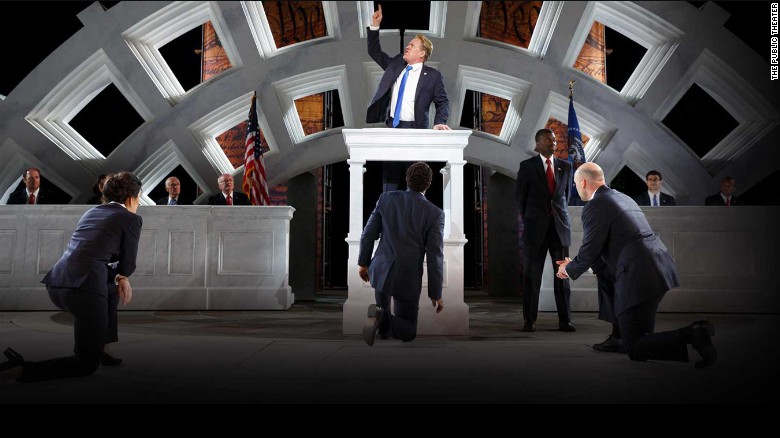The Need for Civil Discourse in American Politics
by Michael Curtis

The insightful 18th century French political philosopher Montesquieu informed us, “there are bad examples which are worse than crimes; more states have perished by the violations of their moral customs than by the violation of their laws.” He could have been referring to what goes for recent political commentary in the United States today. It is an axiom, a fundamental principle of democratic societies that political expression should not only be free and outspoken, even courageous, but also tolerant and polite with understanding of the existence of different, incompatible, but legitimate points of views.
The question has now arisen of whether opposition to, allusions to, and criticism of President Donald Trump, have gone beyond accepted customary behavior. Already this year, concern has arisen over remarks and behavior by so called comedians that have given tastelessness a bad name. Reza Aslan’s remarkable grasp of the English language led him to call Trump a “piece of sh..” Kathy Griffin in a video portrayed a replica of a severed head remarkably like that of Donald Trump.
The network CNN, saying her performance was disgusting, offensive, and totally inappropriate cut ties with Griffin regarding her planned appearance in their New Year’s Eve program. Griffin did apologize and said she had gone “too far,” but this was apparently tongue in cheek and cannot be considered genuine emotion since she then remarked that Trump’s response in criticizing her video was another example of “white guys trying to hold her down.”
To her credit Chelsea Clinton, calling the Griffin video “vile and wrong,” commented that it was never funny to joke about killing a president. By chance, her remark is pertinent to discussion of the production in the theater in New York’s Central Park of Shakespeare’s Julius Caesar. Controversy has arisen over this production, sponsored by NYC Department of Cultural affairs, which portrays Caesar as a middle aged man with blond hair, wearing a business blue suit with a pin of the American flag, a long red tie who is married to an attractive woman speaking with a Eastern European Slavic accent. The actors portraying the killers of Caesar are members of minority groups and women. Graffiti on the stage walls call for “resistance,” a familiar cry today in the streets of American cities.
The resemblance in the production to current persons in the White House is unmistakable. The director Oskar Eustis, in words that are perhaps confusing and inadvertently revealing, said the production was “a warning parable to those who try to fight for democracy by undemocratic means. To fight the tyrant does not mean imitating him.”
For some time, Shakespeare’s plays have frequently been used as a parable or allegory. In 1937 Orson Welles in his Mercury Theater production of Julius Caesar, used the play to indicate the danger of Fascist Italy and Nazi Germany. The New York based The Acting Company in 2012 put on a production of the play with a black Caesar though the actor did not resemble or sound like President Barack Obama.
There are many such productions of Shakespeare that in essence comment on contemporary events or personalities. One, Troilus and Cressida, with its seven year siege by Greeks of Troy, was an allusion to the quagmire in Afghanistan, Another, The Taming of the Shrew, a Central Park production, mocked Trump as an announcer introducing girls at a pageant.
It is familiar that art and culture may make people uncomfortable, and therefore generate calls for censorship or a halt to government funding of something that is considered too outrageous for public display. This was the case in 1989 concerning the controversial photographer Robert Mapplethorpe. His exhibition, The Perfect Moment, featured homosexuality, interracial sex acts, and sadomasochistic photos. It was funded by the National Endowment of Arts (NEA), and thus led to the issue of whether public funds should subsidize the arts if what is considered obscenity is displayed.
In another incident, New York Mayor Rudolph Giuliani in 1999 threatened to cut NYC subsidies to the Brooklyn Museum of Art if it did not cancel a British art exhibition “Sensation” that featured a number of works he considered “sick stuff,” especially a portrait of the Virgin Mary stained with elephant dung by Chris Ofili.
Individuals of course will differ on these attempts or proposals at censorship, over the extent of free speech in the state funded activities, and the degree to which provocative things should be publicly funded or exhibited.
Equally, in a democratic system that prides itself on the importance of free speech, people will differ on whether tasteless political utterances should be outlawed or not funded. The Bank of America and Delta find the Central Park production offensive and have withdrawn their sponsorship of it.
But there should be no difference on the need to reduce the amount of violent rhetoric used against political opponents today in the U.S. and above all to remove suggestions or implication of the assassination of political leaders, especially the President of the country.